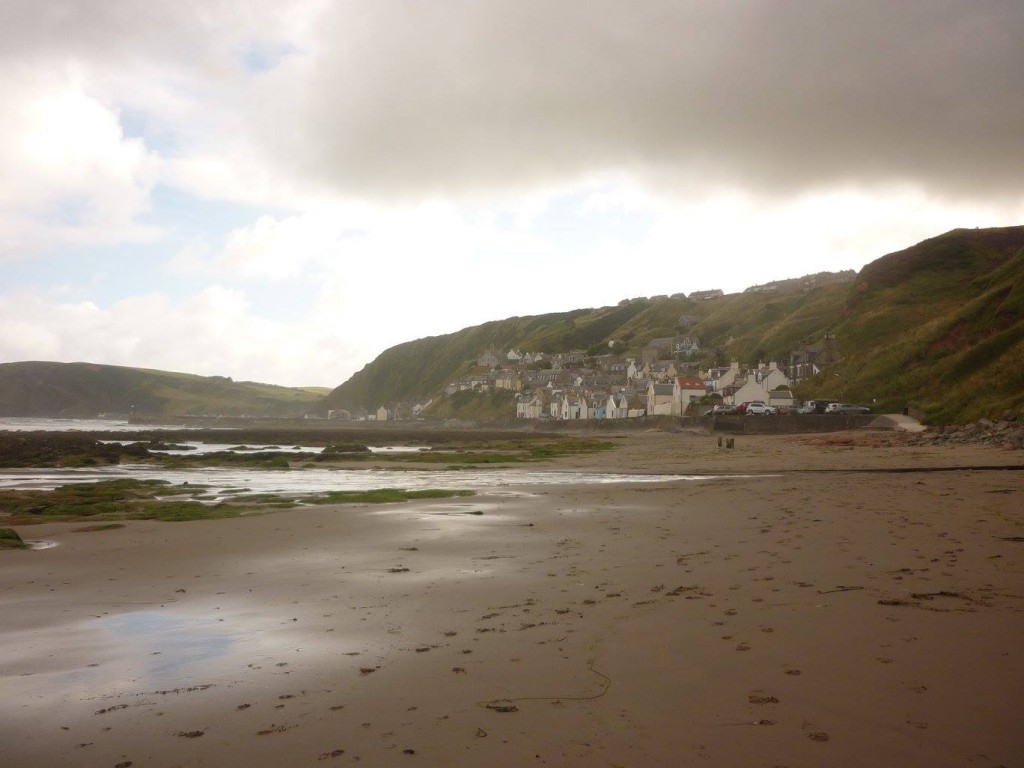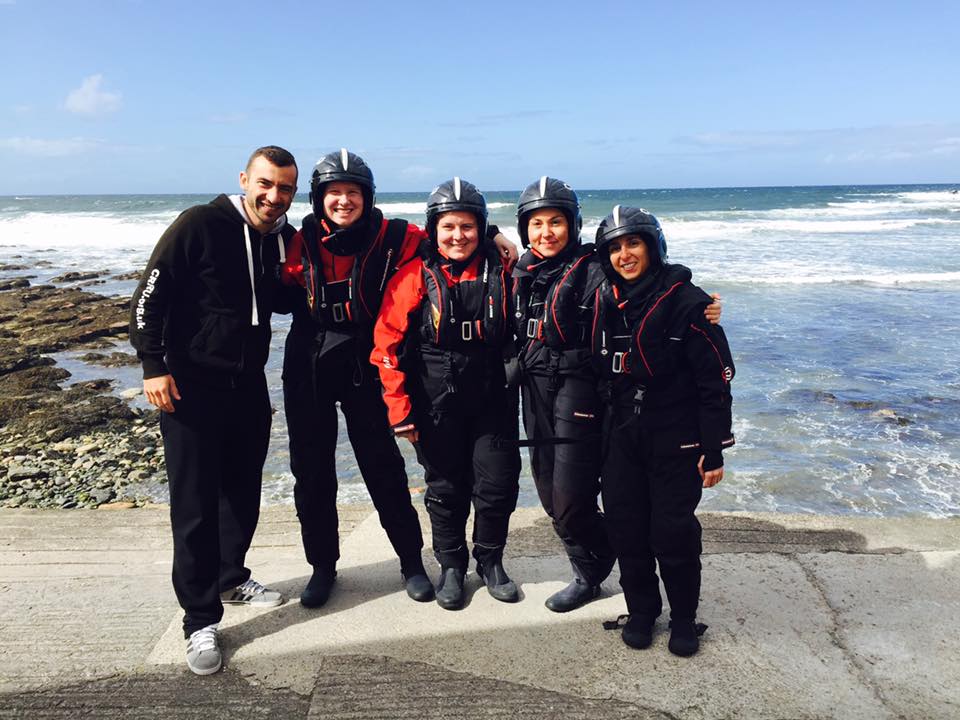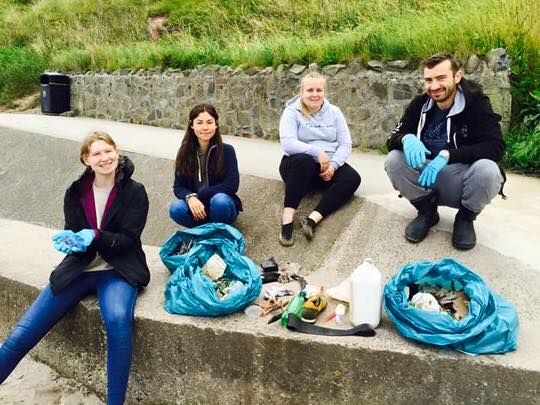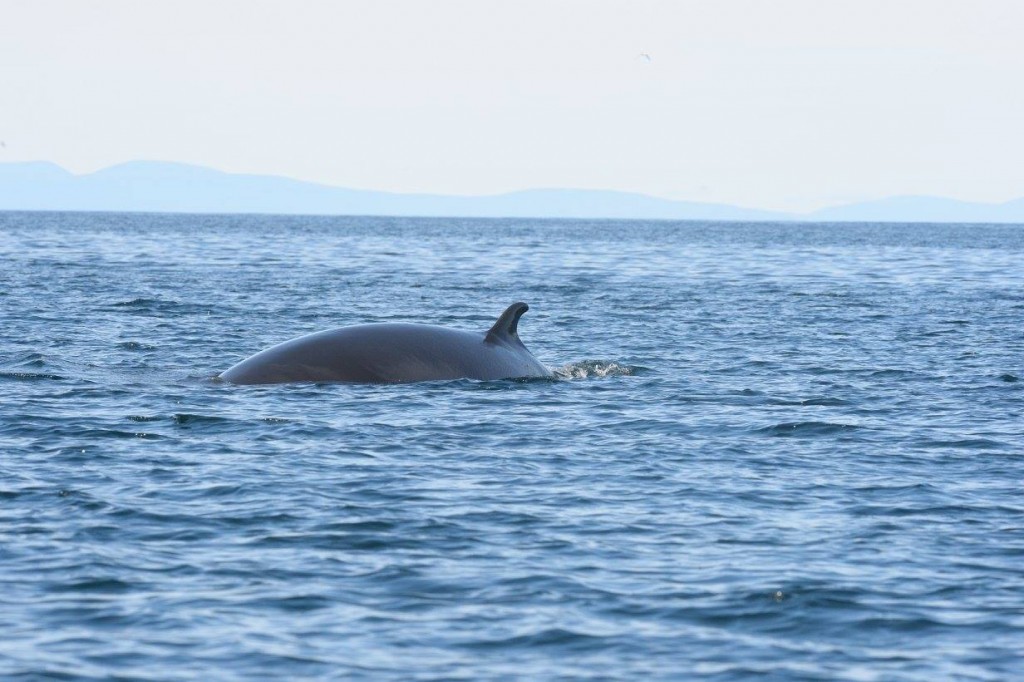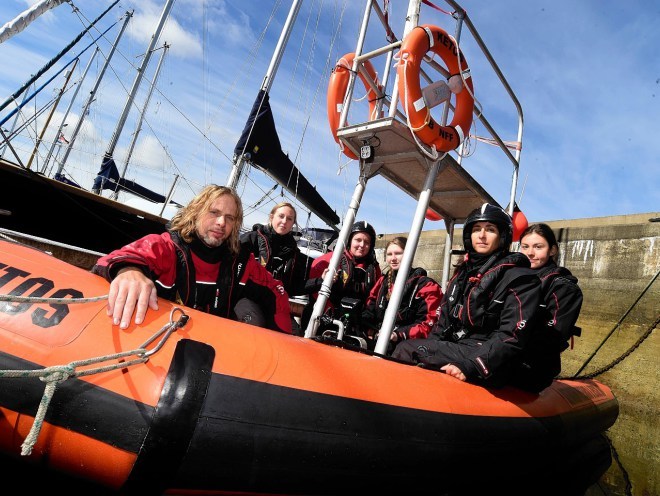Marine Life & Conservation
Cetaceans and conservation: My summer with the CRRU
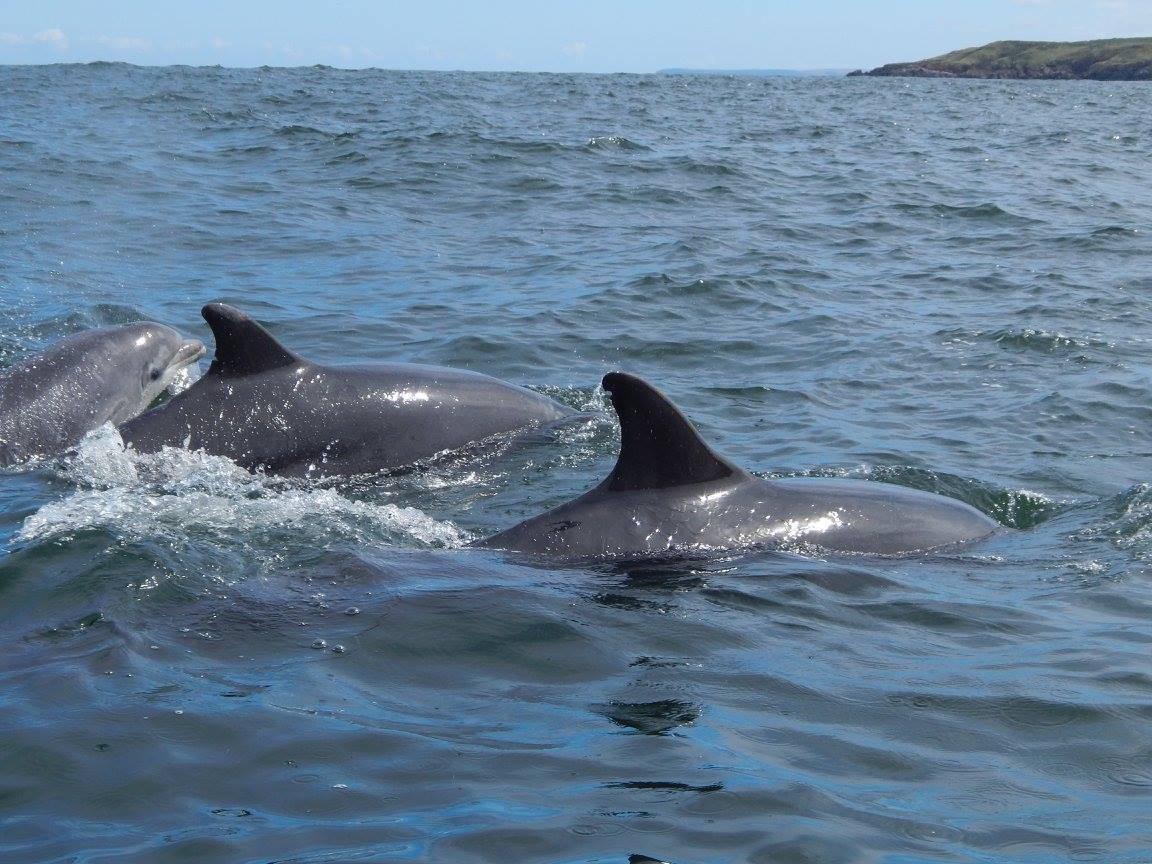
Summer breaks are the opportunity for people to explore new areas and to relax in the sunshine. Mine however took a different angle, spending it in a small village in the north of Scotland. The north east Scottish coastline has a high biodiversity of marine mammals, and provides the perfect setting for innovative work in marine conservation.
The Banff-based CRRU (Cetacean Research & Rescue Unit) was set up in 1997, growing in size thanks to its unstoppable group of dedicated volunteers. Come rain or shine, they are working to improve our knowledge of cetaceans (whales, dolphins and porpoises) in our UK waters, from the ever-popular bottlenose dolphin to the lesser known minke whale.
So where do I start? My summer with the CRRU was a completely eye opening experience. It was my first volunteer experience in this field as a research intern, and I saw more species than I could possibly list; rare birds and marine mammals which people only dream of seeing. But I also felt like I made a difference. Even in my short time there. Not a single day there was ever the same, allowing me to develop different skills and learn different tactics for conservation.
The first few days I was there, a lot of our time was used to learn. Learning about the charity, how to collect data, about the species we would be working with and why what is being done is so important. This allowed the research teams to bond and learn how to work together quickly and effectively so when we finally found the animals we could complete the necessary data forms quickly, thereby causing minimum disruption to the study animals.
The rest of my time was spent between conservation, fund-raising, research and of course having fun! We would spend our days doing a variety of different activities, from beach cleans to watching gannet colonies from the cliff tops.
The charity has an unfathomable amount of publications on the work that they do, and their papers, research and data are used globally for the protection of the species studied. The charity’s science team works tirelessly throughout the summer in Scotland to collect data to improve current knowledge of the whales and dolphins of the Moray Firth. So far, their work has been invaluable to the protection of minke whales in north-east coastal waters resulting in recommendation for the first ever MPA (Marine Protected Area) for these coastal cetaceans in the UK.
Due to being a relatively small charity, the CRRU has limited funding, however. Currently all of their work is being carried-out from one of two small, rigid inflatable boats, but ongoing fundraising is being conducted for a new, much larger vessel which would allow the charity to continue its long-term monitoring studies. The current boats, first used in 2000, are becoming too old and are struggling to keep up with the increasing workload. The research team has a wide variety of work they are attempting to do from the boats when they meet their study species. Currently they are attempting to get biopsies from minke whales to allow them to learn more about what the whales are eating and evaluate the levels of pollutants in their bodies and the surrounding marine environment. They also do behavioural studies and attempt to do temporary tagging of whales so they can study their movements and diving behaviour, which is all very relevant to abundance estimates currently used to designate unfavourable whaling quotas to neighbouring whaling countries such as Norway and Iceland, that sadly still harvest these whales. The new boat will also be central to the CRRU’s emergency response teams for live-stranded whales and dolphins across Scotland. The larger boat will allow the rescue teams to carry more equipment and operate in often inclement and unfavourable sea conditions.
While I was with the CRRU, I was able to gain a qualification in Marine Mammal Rescue, which means I can now act as a volunteer Marine Mammal Medic, assisting in ongoing UK rescue efforts for sick or stranded whales and dolphins which inevitably get into trouble around the UK coastline each year. The course, which is made up of both practical and theory based sessions is run by the charity as a free service to interested volunteers. So far they have trained over 1,600 people in Scotland. They don’t do this work for the research but to look after the welfare of the animals. The CRRU have a 24/7 line for people to call if they find a stranded marine animal, and they operate the only dedicated specialist response team for whales, dolphins and porpoises in Scotland. For more information about the charity’s rescue efforts, Check out their website here.
Don’t just take my word for it – to me and many people who have joined the CRRU as a volunteer intern, this is an amazing opportunity with fantastic people who know so much in this field. So why don’t you try it out too? Summer placements are now being accepted for 2017 – click here to find out more.
If you would like to donate towards the new boat, you can also help by clicking on their fundraising page here.
Marine Life & Conservation
Leading UK-based shark conservation charity, the Shark Trust, is delighted to announce tour operator Diverse Travel as a Corporate Patron

 Corporate Patrons provide a valuable boost to the work of The Shark Trust. The Trust team works globally to safeguard the future of sharks, and their close cousins, the skates and rays, engaging with a global network of scientists, policymakers, conservation professionals, businesses and supporters to further shark conservation.
Corporate Patrons provide a valuable boost to the work of The Shark Trust. The Trust team works globally to safeguard the future of sharks, and their close cousins, the skates and rays, engaging with a global network of scientists, policymakers, conservation professionals, businesses and supporters to further shark conservation.
Specialist tour operator Diverse Travel has operated since 2014 and is committed to offering its guests high quality, sustainable scuba diving holidays worldwide. Working together with the Shark Trust will enable both organisations to widen engagement and encourage divers and snorkellers to actively get involved in shark conservation.
“Sharks are truly at the heart of every diver and at Diverse Travel, we absolutely share that passion. There is nothing like seeing a shark in the wild – it’s a moment that stays with you forever!” says Holly Bredin, Sales & Marketing Manager, Diverse Travel.
“We’re delighted to celebrate our 10th year of business by becoming a Corporate Patron of the Shark Trust. This is an exciting partnership for Diverse and our guests. We will be donating on behalf of every person who books a holiday with us to contribute towards their vital shark conservation initiatives around the world. We will also be working together with the Trust to inspire divers, snorkellers and other travellers to take an active role – at home and abroad – in citizen science projects and other activities.”
Paul Cox, CEO of The Shark Trust, said:
“It’s an exciting partnership and we’re thrilled to be working with Diverse Travel to enable more divers and travellers to get involved with sharks and shark conservation. Sharks face considerable conservation challenges but, through collaboration and collective action, we can secure a brighter future for sharks and their ocean home. This new partnership takes us one more valuable step towards that goal.”
For more information about the Shark Trust visit their website here.
For more about Diverse Travel click here.
Marine Life & Conservation
Shark Trust Asks Divers to help with Shark Sightings this Global Citizen Science Month

 Whether you are stuck for ideas of what to do with the kids or are off on the dive trip of your dreams. You can get involved in Citizen Science Month and help the Shark Trust by providing vital data about sharks are rays both close to home and further afield.
Whether you are stuck for ideas of what to do with the kids or are off on the dive trip of your dreams. You can get involved in Citizen Science Month and help the Shark Trust by providing vital data about sharks are rays both close to home and further afield.
In addition to reporting the sharks and rays you see on your dives, the eggcases you find on the beach, the Shark Trust is looking for some specific data from divers who are asked to report any Oceanic Whitetip and Basking Sharks.
Oceanic Whitetip Sharks
The Shark Trust are looking specifically for Oceanic Whitetip Shark sightings over the coming weeks and months. So, if you are diving anywhere in the world, please report your sightings via the website or app.
Website: https://recording.sharktrust.org/
App: Search The Shark Trust in your app store
The Oceanic Whitetip. Known for their incredibly long dorsal and pectoral fins, this species was once the most abundant oceanic-pelagic species of shark on the planet.
Large and stocky, they are grey or brown above, and white below and famous for their huge rounded first dorsal fin and paddle-like pectoral fins. The fins also highly prized within the shark fin trade. Whilst they are mostly solitary, Oceanic Whitetips do occasionally hunt in groups.
An inquisitive species, they were easy prey for fisheries. Combined with their low reproductive rate, they were inevitably at high risk of population depletion. And declines of up to 99% have been reported in certain sea areas. They are listed as Critically Endangered on the IUCN Redlist (2019).
Conservation efforts to discourage further declines include listing on CITES Appendix II and CMS Appendix I. They’re also the only species prohibited from take by all the Tuna RFMOs (Regional Fisheries Management Organisations). However, these measures do not mean that Oceanic Whitetips are not still caught – whether targeted or as bycatch – in some parts of the world. With populations declining at such a high rate, effective implementation of management measures is essential to ensure that the species can recover.
If you are lucky enough to get an image of an Oceanic Whitetip and you record your sighting on the Shark Trust app or website YOU CAN WIN! All images submitted with sightings, that also give consent to use in conservation messaging, will be in with a chance to win an Oceanic Whitetip T-shirt and mug. The competition will run until the end of “Shark Month” in July – so keep those sightings (and images) coming in.
Basking Sharks
Basking Shark (Cetorhinus maximus) season is upon us, and the Shark Trust is asking everyone to keep an eye out for these majestic giants over the summer months. If you see any, you can record your sighting to the Basking Shark Sightings database.
Each year, these mighty fish return to British waters to feed on plankton. You may see one, (or a few if you’re really lucky) from around April-October. They can be seen feeding at the surface of the water, where they look like they’re basking in the sun. Thus, their name!
Sighting hotspots around the British Isles include southwest England, Isle of Man, north coast of Ireland, and western Scotland. The Sea of the Hebrides is the most prolific sightings area in Scotland, but they have been spotted all around the coast and have even ventured into some of the sea lochs. The Shark Trust has received thousands of sightings since the Basking Shark project began, but more data is needed to truly understand what is going on with population numbers and distribution. You can help by recording your sightings this summer.
Great Eggcase Hunt
The Shark Trust has an Easter Egg Hunt with a difference for you to try. Take part in the Great Eggcase Hunt and get involved with a big citizen science project that helps shark, ray and skate conservation. And it’s an enjoyable activity for all the family.
The Shark Trust also want snorkellers and divers to record their underwater eggcase findings. Underwater records help pinpoint exactly where sharks and skates are laying their eggs and can help link to beach records. Learning the depth and substrate that they lay on also helps better understand the species.
Find out more: https://www.sharktrust.org/great-eggcase-hunt
Whether you are diving, snorkelling or exploring on the beach you can take part in Citizen Science Month and get actively involved in shark and ray conservation. Find out more: www.sharktrust.org
-

 News3 months ago
News3 months agoHone your underwater photography skills with Alphamarine Photography at Red Sea Diving Safari in March
-

 News2 months ago
News2 months agoCapturing Critters in Lembeh Underwater Photography Workshop 2024: Event Roundup
-

 Marine Life & Conservation Blogs2 months ago
Marine Life & Conservation Blogs2 months agoCreature Feature: Swell Sharks
-

 Blogs2 months ago
Blogs2 months agoMurex Resorts: Passport to Paradise!
-

 Blogs2 months ago
Blogs2 months agoDiver Discovering Whale Skeletons Beneath Ice Judged World’s Best Underwater Photograph
-

 Gear News3 months ago
Gear News3 months agoBare X-Mission Drysuit: Ideal for Both Technical and Recreational Divers
-

 Gear Reviews2 months ago
Gear Reviews2 months agoGear Review: Oceanic+ Dive Housing for iPhone
-

 Marine Life & Conservation2 months ago
Marine Life & Conservation2 months agoSave the Manatee Club launches brand new webcams at Silver Springs State Park, Florida


